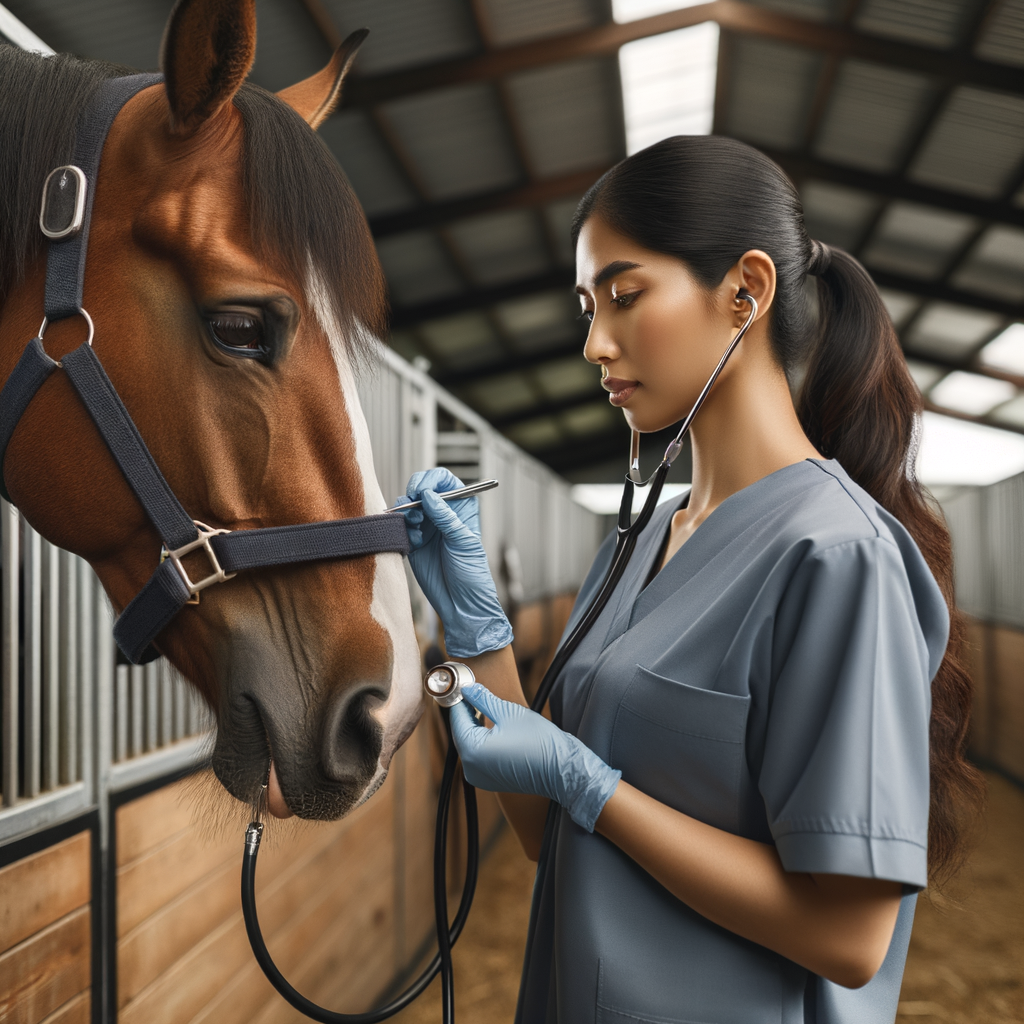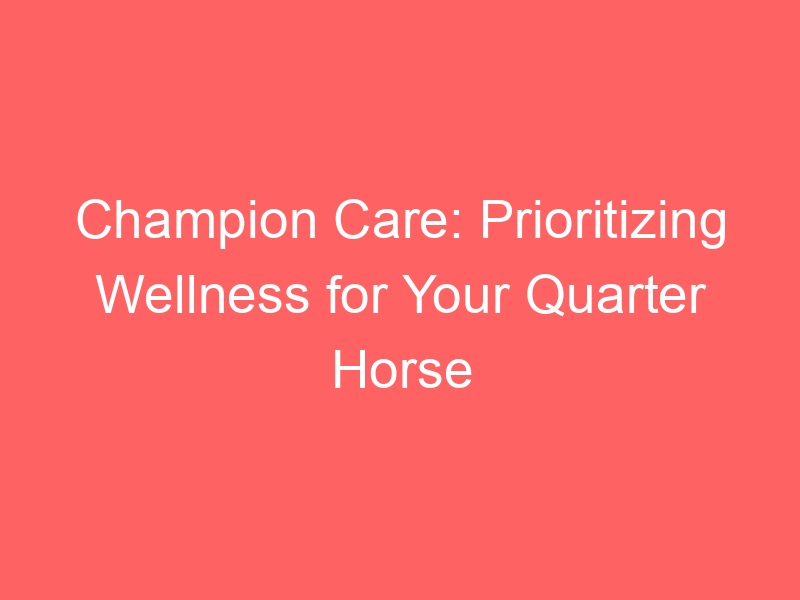
Introduction to Quarter Horse Health
Welcome to our comprehensive guide on Quarter Horse health. This breed of horse, known for its speed and agility, requires special attention to maintain optimal health. Let’s delve into the importance of prioritizing horse health and the common health issues that Quarter Horses often face.
- Importance of Prioritizing Horse Health
- Overview of Common Health Issues in Quarter Horses
Ensuring the health of your Quarter Horse is paramount. A healthy horse is not only happier but also performs better, whether in racing, working, or simply as a companion. Regular vet check-ups, a balanced diet, and adequate exercise are all vital components of horse health. Ignoring these aspects can lead to serious health issues, decreased lifespan, and a diminished quality of life for your horse.
Quarter Horses, like all breeds, are susceptible to certain health issues. Some of the most common include Laminitis, a painful condition affecting the horse’s feet, and Equine Metabolic Syndrome, a hormonal disorder. Other common issues include Colic, a digestive disorder, and various respiratory diseases. Being aware of these conditions and their symptoms can help you take prompt action and possibly save your horse’s life.
Remember, prevention is always better than cure. Regular health checks, a proper diet, and a good exercise regimen can go a long way in preventing these common health issues. Stay tuned as we delve deeper into comprehensive care for Quarter Horses in the next section.
Comprehensive Care for Quarter Horses
As a horse owner, it’s crucial to understand the comprehensive care required for Quarter Horses. These horses are known for their speed and agility, making them popular for various equestrian activities. However, they also require specific care and attention to maintain their health and performance.
Quarter Horse Care Basics
Let’s start with the basics of horse care. These fundamental steps are essential for every horse owner, especially those new to the world of equestrian care.
- Understanding the Basics of Horse Care
- Essential Horse Care Tips
- Provide a clean and safe environment: Keep your horse’s stall clean and free from hazards. Regularly check for any sharp objects or harmful substances that could harm your horse.
- Regular vet check-ups: Regular veterinary check-ups are essential to monitor your horse’s health and detect any potential issues early.
- Proper nutrition: Ensure your horse is getting the right nutrients from their diet. Consult with a vet or a horse nutritionist to create a balanced diet plan.
- Regular exercise: As mentioned earlier, regular exercise is crucial for Quarter Horses. It helps keep them fit and prevents health issues related to inactivity.
Basic horse care involves regular feeding, grooming, and exercise. Quarter Horses typically eat a diet of hay and grain, with access to fresh water at all times. Regular grooming helps keep their coat, mane, and tail clean and healthy. Exercise is also crucial for these active horses, as it helps maintain their muscle tone and overall health.
Here are some essential tips for taking care of your Quarter Horse:
Understanding and following these basic care tips can significantly improve the health and well-being of your Quarter Horse. Remember, a healthy horse is a happy horse!
Advanced Quarter Horse Care
As we delve deeper into the world of Quarter Horse care, it’s essential to understand that these majestic creatures require more than just basic care. Advanced care tips and understanding genetic health issues are crucial aspects of ensuring your Quarter Horse’s optimal health and longevity.
- Advanced Health Tips for Quarter Horses
- Diet: A Quarter Horse’s diet should be rich in fiber and include a balanced mix of grains, hay, and pasture grass. It’s also essential to provide clean, fresh water at all times.
- Exercise: Regular exercise is vital for a Quarter Horse’s health. It helps maintain their weight, strengthens their muscles, and improves their cardiovascular health.
- Health Check-ups: Regular veterinary check-ups can help detect any potential health issues early. These check-ups should include dental exams, vaccinations, and deworming.
- Understanding and Managing Genetic Health Issues
Advanced care for Quarter Horses involves a comprehensive understanding of their dietary needs, exercise routines, and regular health check-ups. Here are some tips:
Genetic health issues can pose significant challenges to Quarter Horses. Some common genetic disorders include Polysaccharide Storage Myopathy (PSSM) and Hyperkalemic Periodic Paralysis (HYPP). Understanding these conditions and managing them effectively is crucial for your horse’s health.
| Genetic Disorder | Symptoms | Management |
|---|---|---|
| Polysaccharide Storage Myopathy (PSSM) | Weakness, muscle stiffness, and difficulty moving | High-fat, low-starch diet and regular exercise |
| Hyperkalemic Periodic Paralysis (HYPP) | Muscle twitching, weakness, and collapse | Low-potassium diet and avoiding fasting |
Remember, early detection and proper management of these genetic disorders can greatly improve your Quarter Horse’s quality of life. Always consult with a veterinarian for the best care strategies.
Prioritizing Wellness for Quarter Horses
When it comes to ensuring the health and longevity of your quarter horse, prioritizing wellness is key. This involves a comprehensive approach that includes regular vet check-ups and a balanced diet, among other things.
Equine Wellness Practices
There are several practices that can help maintain the wellness of your quarter horse. Two of the most important ones are:
- Importance of Regular Vet Check-ups
- Role of Nutrition in Equine Wellness
Regular vet check-ups are crucial for maintaining the health of your quarter horse. These check-ups allow for early detection of potential health issues, making treatment more effective. According to a study by the American Veterinary Medical Association, horses that receive regular vet check-ups are less likely to develop serious health problems.
Nutrition plays a vital role in equine wellness. A balanced diet ensures that your horse gets all the necessary nutrients for optimal health. This includes a mix of grains, hay, fruits, vegetables, and plenty of fresh water. According to the National Research Council, horses require specific nutrients such as proteins, vitamins, and minerals to maintain good health. Therefore, it’s important to provide a diet that meets these nutritional requirements.
By prioritizing these wellness practices, you can ensure that your quarter horse remains healthy and active for many years to come.
Maintaining Quarter Horse Health
Ensuring the health of your Quarter Horse is a top priority. This involves both physical and mental aspects. Let’s delve into the specifics of maintaining their health.
- Exercise and Training Routines for Quarter Horses
Regular exercise is crucial for a Quarter Horse’s health. It helps keep their muscles strong and their minds sharp. A typical exercise routine for a Quarter Horse might include a mix of walking, trotting, and cantering, along with specific training exercises to improve their skills.
For instance, you might start with a 15-minute walk to warm up, followed by 20 minutes of trotting and 10 minutes of cantering. Then, you could spend another 15 minutes on training exercises, such as jumping or dressage moves, before cooling down with a 10-minute walk.
Remember, every horse is unique. What works for one might not work for another. It’s important to tailor your horse’s exercise routine to their individual needs and abilities.
- Importance of Mental Health in Horses
Just like humans, horses also need to maintain good mental health. Mental stimulation is key to a horse’s wellbeing. Horses are intelligent creatures and they need activities that challenge their minds.
One way to promote mental health in horses is through training exercises that require them to think and solve problems. For example, you might set up an obstacle course and guide your horse through it. This not only provides physical exercise, but also mental stimulation.
Another important aspect of mental health in horses is social interaction. Horses are herd animals and they thrive in the company of others. Make sure your horse has plenty of opportunities to interact with other horses.
Lastly, a calm and stable environment is essential for a horse’s mental health. Avoid sudden changes in routine or environment, as these can cause stress and anxiety in horses.
In conclusion, maintaining Quarter Horse health involves a balance of regular exercise, mental stimulation, and a stable environment. By paying attention to these aspects, you can ensure your horse stays healthy and happy.
Case Studies: Success Stories in Quarter Horse Care
Let’s delve into some real-life examples of Quarter Horses that have overcome health challenges and have been successfully rehabilitated. These case studies will provide you with insights into the dedication, care, and knowledge required to ensure the health and wellness of these magnificent creatures.
- Case Study 1: Overcoming Health Challenges
- Case Study 2: Successful Rehabilitation of a Quarter Horse
Meet Thunder, a 7-year-old Quarter Horse who was diagnosed with a severe case of laminitis, a painful condition that affects the horse’s feet. Thunder’s owners noticed he was limping and immediately contacted their vet. After a thorough examination and diagnosis, Thunder’s treatment plan included a special diet, medication, and regular hoof care.
It was a long road to recovery, but with consistent care and monitoring, Thunder was able to overcome his health challenge. Today, he is back to his energetic self, galloping around the pasture with ease. This case highlights the importance of early detection, immediate veterinary intervention, and consistent care in managing health challenges in Quarter Horses.
Next, we have the story of Bella, a Quarter Horse who was rescued from a neglectful situation. When Bella was found, she was severely underweight and suffered from a variety of health issues, including parasites and a skin condition. Bella was taken in by a local horse rescue organization, where she began her journey to recovery.
With a carefully tailored diet, regular veterinary care, and lots of love and attention, Bella gradually regained her health and strength. Today, Bella is a picture of health and happiness, a testament to the resilience of Quarter Horses and the power of proper care and rehabilitation.
These case studies serve as a reminder of the importance of proper care and attention to the health of Quarter Horses. With the right knowledge, resources, and commitment, we can ensure that these beautiful creatures lead healthy, happy lives.
Conclusion: The Future of Quarter Horse Health
As we look towards the future, it’s clear that the health of Quarter Horses will continue to be a priority. With advances in technology and veterinary medicine, we can expect to see some exciting trends in equine health. Let’s explore these emerging trends and key takeaways for maintaining Quarter Horse health.
- Emerging Trends in Equine Health
- Key Takeaways for Maintaining Quarter Horse Health
One of the most significant trends in equine health is the use of technology for early detection of diseases. For instance, wearable devices are being developed to monitor a horse’s heart rate, respiratory rate, and temperature. This allows for early intervention and treatment, improving the horse’s chances of recovery.
Another trend is the increased focus on mental health. Just like humans, horses can experience stress and anxiety. Recognizing and addressing these issues can greatly improve a horse’s overall well-being.
Firstly, regular check-ups are crucial. Early detection of potential health issues can make a significant difference in treatment outcomes. It’s recommended to have a vet examine your Quarter Horse at least once a year.
Secondly, a balanced diet is key. Quarter Horses require a diet rich in fiber, protein, and essential vitamins and minerals. Consult with a vet or equine nutritionist to ensure your horse is getting the nutrients it needs.
Lastly, don’t overlook the importance of exercise and mental stimulation. Regular physical activity helps maintain a healthy weight and strong muscles, while mental stimulation can prevent stress and anxiety.
In conclusion, the future of Quarter Horse health looks promising. By staying informed about emerging trends and following key health maintenance practices, we can ensure our beloved Quarter Horses live long, healthy lives.









